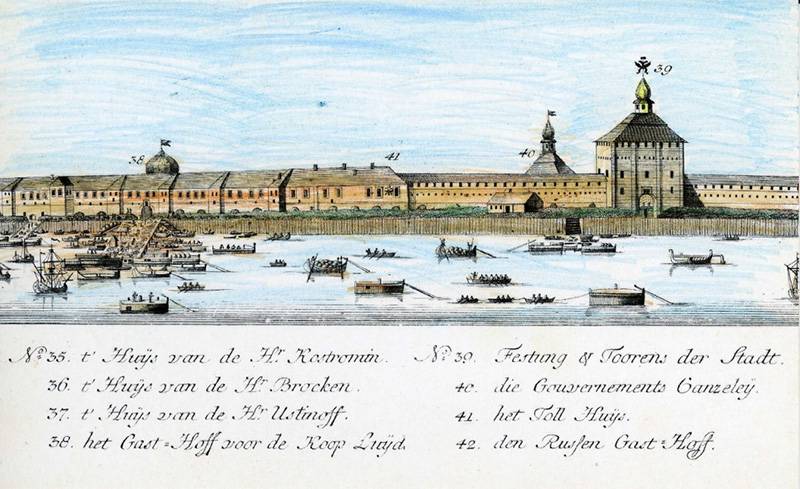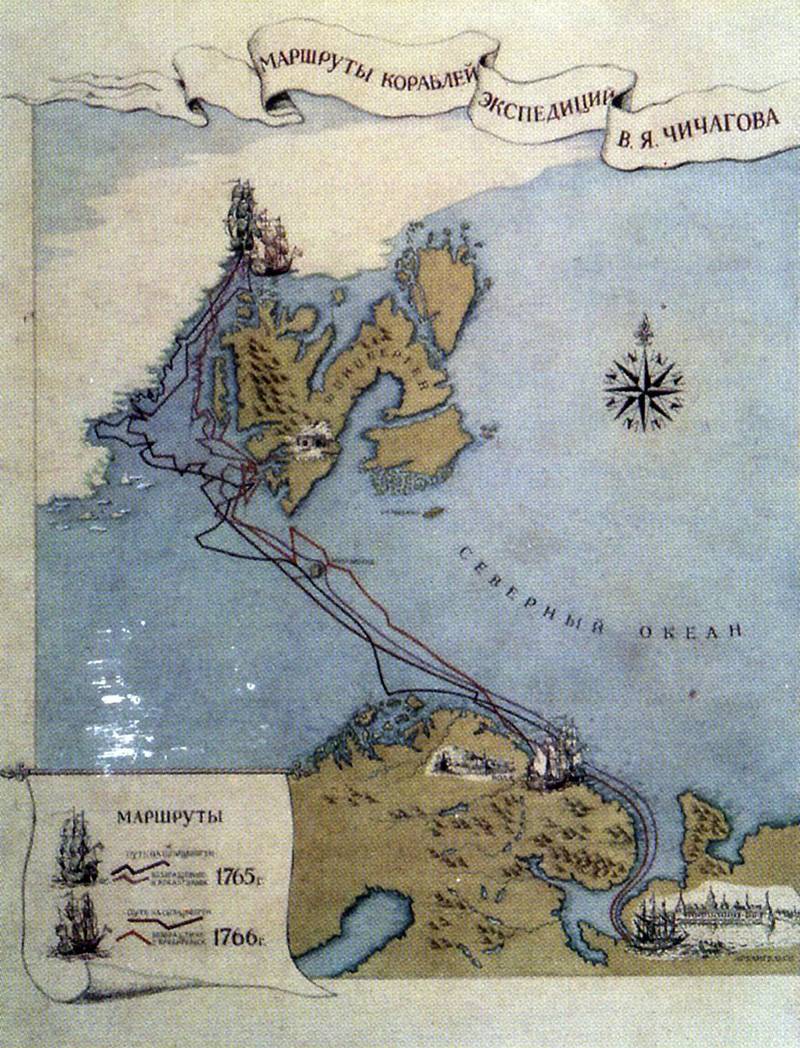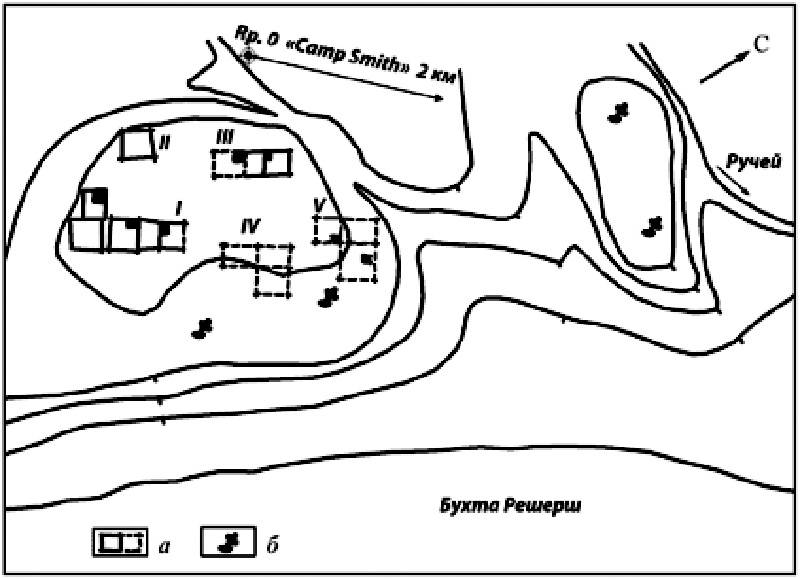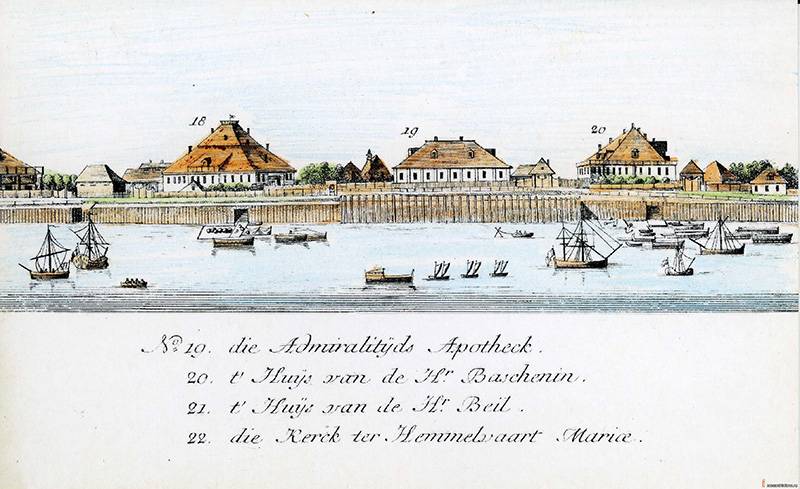Admiral Vasily Yakovlevich Chichagov: The Second Arctic Expedition and Service in Arkhangelsk

In the report of Chichagov, the main reason for the inability to achieve the goal was indicated by solid ice and the complete absence of passes. After reviewing the documents, the Admiralty Board, despite its displeasure, decided that the next year should try again to go to the Pacific Ocean. Having received information about this, Vasily Yakovlevich gave the order to the expedition ships to switch to wintering in Ekaterininskaya Harbor, along with two bots loaded with provisions. In the same place it was supposed to repair and strengthen the damaged lining before a new attempt to storm the polar latitudes.
Chichagov himself was summoned to a thorough report to the capital. Obviously, Count Chernyshev wanted to express his genuine discontent, which was replaced by equally sincere optimism, personally to the captain-commander. Her Majesty also frowned a little. The thing is that the Admiralty Collegiums were unswervingly confident that the failure of the expedition was caused by almost the most serious official fault: failure to comply with instructions. They intended to ask with all strictness - there were a lot of hardened professionals in the college, salted at best by the harsh waters of the Gulf of Finland.
Personalities such as Vice-Admiral Alexei Ivanovich Nagaev, a cartographer, scientist, member of the Bering's 1 Kamchatka Expedition, were rare interspersed among figures with stern faces, weathered by a merciless Neva breeze. Chichagov arrived in St. Petersburg in December 1765 of the year and made detailed explanations and stories about sailing in heavy polar ice, and why, against the will of the most respectable members of the Admiralty Board and even Her Majesty, the expedition ships could not pass through solid ice fields. Vice-Admiral Nagaev, having thoroughly reviewed the submitted materials, expressed the opinion that Vasily Yakovlevich Chichagov acted competently, skillfully, bravely and diligently. No fault was found in the actions of the expedition commander, and the Admiralty Board, squeaking for order, approved the command of Chichagov.
It was necessary, except for the previously assigned tasks, to pick up a group of seamen from Svalbard, where they had to spend the second wintering. The thing was that in the current 1765 year, the ship sent from Arkhangelsk could not make it to the island because of the difficult ice conditions, and the Robinsons inevitably had to continue their sitting in the Clockby bay.
Expedition 1766 year compared with last year began with a significant delay. The ships left Ekaterininskaya harbor 19 in May. The first ice was seen near Bear Island, the weather worsened - fogs became frequent. Chichagov led his ships to Spitsbergen, and only 21 on June 1766, the expedition reached the bay Clockby, where its intermediate base was originally located.

Heavy ice conditions forced the captain to order anchor at a considerable distance from the coast. The dramatic circumstances of the stay of a group of winterers from 16 people came to light: during the second, incredibly severe wintering, scurvy among the sailors began to rage, with the result that 8 of them died. Perhaps the situation would have been even more tragic if it were not for the coast-dweller’s ship, sticking to the island for the winter, thirty miles from Clokbai.
After helping the survivors, first of all the healing ones, using anti-scoring means, Chichagov again on July 1 took out three of his ships to the sea and moved along the coast of Svalbard to the north. The weather did not spoil - frequent fogs and ice forced Russian sailors to go to drift. On July 16, the northern end of the island was reached with great difficulty. Further extended a solid ice barrier, to overcome which there was no possibility. It was clear that this time the Arctic easily repulsed a desperate attempt by a man to penetrate into its depths.
An officer meeting was convened at which they decided to return. July 30, 1766 flotilla again approached the bay Klokby. The Lapomink pink was immediately met under the command of Captain Lieutenant Nemtinov, who was finally able to deliver fresh food, firewood and other materials for wintering from Arkhangelsk. This time, Chichagov acted differently - it is unlikely that, in view of obvious circumstances, a third attempt would be made to get to the northern latitudes to the Pacific Ocean, so it was decided to evacuate the base on Svalbard.
From July 31 to August 7, ships were loaded. Weighed everything that was considered valuable, including usable foods. Taking from the shore of all the remaining sailors under the command of Lieutenant Ryndin, ships Chichagova left the bay. The remains of the wintering of Russian sailors were discovered only in 1979 year - Soviet scientists made archaeological excavations at this place for several seasons in a row.

The expedition ships returned to Arkhangelsk 10 September 1766, and on September 15 Chichagov sent a letter to Count Chernyshev, in which he reported the results of the second expedition. At the same time, he sent a detailed report to the Admiralty Board. In it, the head of the expedition described in detail the course of the second expedition and the reasons for which it was not possible to achieve the goals. As in the first case, it was a difficult ice situation, as a result of which the ships had no opportunity not only to reach the Pacific Ocean, but also to penetrate north of Spitsbergen.
As evidence of his words, Chichagov cited facts from a conversation with the captain of a Dutch fishing vessel that met Russian sailors. The Dutchman has been regularly in the Arctic for almost 10 for years and categorically stated that there is no free ice from the north of Spitsbergen. It is likely that Chichagov deliberately referred to this captain - for domestic stories there are periods when foreigners were more likely to believe than their own.
One way or another, Catherine II ordered the completion of attempts to find the northern route. There was absolutely no need to spend resources on a project that could not be implemented under the current circumstances. In fairness it should be noted that the empress ordered to award all participants cash bonuses in the amount of annual salaries, not excluding the coast-dwellers participating in the enterprise. For the dead sailors, their families received awards. The expedition was officially closed.
22 December 1766, Catherine II signed another decree, according to which Chichagov and all his distinguished officers receive a lifetime pension at half the salary, which they received during the expedition. Despite the favors shown, both Count Chernyshev and the water dividers at the St. Petersburg embankment, which were in abundance in the Admiralty Board, were still “firing” towards the captain-commander in disgusting judgments.
Chernyshev can be understood - in case of success of the enterprise, a dense downpour of awards, officials, orders and villages would have fallen on its organizers. In order to fend off completely unjustified attacks, Chichagov even had to draw up a special explanatory note in January 1767, in which he had to explain the situation to the most skeptical gentlemen, who might have remembered the Empress Anna Ioannovna Ice House, but they had absolutely no idea what the Arctic ice. Little by little, the passions raised by coastal experts subsided, and Vasily Yakovlevich decided to make changes in his personal life.
Between hikes and wars
The captain-commander, who was already 40 years old, completed his long solitary "voyage" by marrying an officer's widow. The wife’s father was also a military man from Saxony. In the first four years of their family life, the couple had five children - four sons and one daughter. Unfortunately, the known smallpox epidemic, 1768, did not bypass the Chichagov family, taking away their two eldest sons. The third son, Paul, the future admiral, almost died. All these years the family lived quite modestly. Chichagov himself was from poor nobles, his salary did not allow a large family of excesses in the form of huge estates with feasts and hunts.

The entire 1767 officer returning from the Arctic served in St. Petersburg, but in June of the following year he again had the opportunity to see Arkhangelsk, where Chichagov had already been sent as the chief commander of the port. Despite the “window to Europe” cut by Peter I and the foundation of St. Petersburg, Arkhangelsk, as before, played a crucial role in the Russian economy. And here, as before, warships were built, which later transferred to Kronstadt. A well-developed shipbuilding production functioned in the north, and the presence of a large amount of ship forest growing here made it profitable as well. Chichagov was appointed to this important and responsible post on the eve of the next Russian-Turkish war.
By 1768, the Turkish Sultan and his numerous confidants, who were enthusiastically feeding at the throne of the Brilliant Ports, noticed an amazing thing: the traditional offerings from respected Western partners in the person of the ambassadors of some island and neighboring states became somewhat harder. Gentlemen in wigs obviously hinted at something and did it without any manifestation of embarrassment, and their generosity was limited only by budgets of inconspicuous rooms and offices.
The whole thing was in the Russian bear, which rather dexterously tossed in the rapidly dimming and losing its former enthusiasm for the Polish-Lithuanian Commonwealth, crushing the Versailles tails sticking here and there. The state crisis, coupled with gentry riots and popular uprisings, like the sea, spread throughout the country. And in its center on a fragile royal boat with Russian oars with a proud look, though with a face that was whitened with horror, His elective Majesty Stanislav Augustus Poniatowski sat. Gentlemen in wigs in Istanbul did not try in vain, and soon the rebel-gaydamak detachment, which crossed the Polish-Turkish border in the excitement of the chase, miraculously turned into a division of the Russian army, and the centurion Shiloh who headed them became the Russian officer.
In fact, the rebels fighting against the Polish gentry attacked the Polish city of Baltu (now a city in the Odessa region). The fighting spread to the neighboring village, which was already on Turkish territory. As a result, the border incident was resolved at the commanding level between the Haidamaks and the local Turkish leadership. And it would have happened one of the many episodes of the routine bloody bedlam in the expanses of the Commonwealth, if the desire of the Turks to war is not intensified and warmed up by the gentlemen in wigs. Trying to open his eyes to obvious stupidity, the Russian ambassador to Prunings was sent to the Seven Towers castle, and war broke out between the two empires, to the most sincere joy of the respected Western partners.
The Archipelago squadron was being prepared for shipment to the Mediterranean, an idea about which had begun to take shape in the Russian court from the first years of Catherine II’s rule. For the first time in the history of the young Russian fleet, such a large naval formation was to leave the Baltic and go on a hike far by that measure. The Empress took the fleet in no way the best condition, despite the allocation of significant amounts (some of which, however, was absorbed by the depths far from the sea), he was efficient only conditionally.
The first years of the young empress's rule were marked, among other things, by an increase in shipbuilding programs: axes knocked on the stocks of St. Petersburg and Arkhangelsk, and saws squealed. In Poland, it was restless, alarming news came from Istanbul. Therefore, Vasily Yakovlevich Chichagov as the chief commander of the port of Arkhangelsk had a whole range of tasks.
In the summer of 1769, the first squadron under the command of Vice Admiral Spiridov was ready to go to the Mediterranean. It was also called “sheathed”, since the underwater part of all the ships that were part of it was sheathed with an additional layer of oak boards. It was only part of the forces of the expeditionary fleet, intended for combat operations in the eastern Mediterranean, and primarily in the region of Greece. It was assumed that the war with the Ottoman Empire would last more than one year, and therefore the shipyards of Arkhangelsk were loaded.
According to orders from the capital, from May to November 1769, four ships were laid here. Three of them were lowered in the spring of 1770, and one in a year. Moreover, the active Chichagov reported to St. Petersburg that the available forces had brought six production slipways to production. Admiralty Board decided to lay on them another six 66-gun battleships. In the fall of 1770, the first three of them were laid.
However, despite the war, which took place, however, in lands and waters too far from the north, such administrative and official activities of Vasily Yakovlevich interfered with a whole host of officials whose habitat and, most importantly, the food supply were located here in Arkhangelsk. The port administration in the person of Deputy Chichagov and other highly respectable personalities with might and main used their official position and, although there was a war, they did not cease to work with enthusiasm to improve their financial situation. The activities of this coordinated team covered the local governor.
Complaints against St. Petersburg fell on Chichagov, who was trying to restore order in the port and at the shipyards, - Arkhangelsk officials mobilized all their connections in the capital. The result of this struggle for the freedom of stuffing personal chests with state funds was, in the end, the transfer of Vasily Yakovlevich Chichagov to a new duty station. In the spring of 1770, he received an order from the Admiralty Board to hand over the affairs to his deputy and arrive in St. Petersburg for a new appointment.
To be continued ...
Information